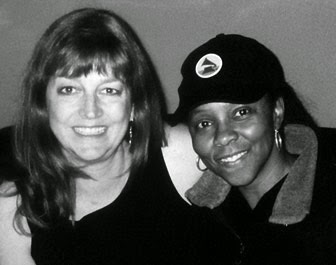Lady, Be Better Than Good: The steep climb to respect of American jazzwomen is documented on film
Chances are that the International Sweethearts of Rhythm or Ina Ray Hutton and Her Melodears will never be subject to the perpetual nostalgia-tripping that the Glenn Miller Band enjoys.
For one thing, the tributes would come too late, and they would probably be seen as sexist. But, as Kay D. Ray's 80-minute documentary, "Lady Be Good: Instrumental Women in Jazz," makes clear, a lot of big-band history involved all-female ensembles, and along the way, there were many individuals who demonstrated that women on the bandstand shouldn't be restricted to their warbling sex appeal.
The film was shown at Central Library Monday afternoon, preceded by an appetizing mini-set by the Monika Herzig Quartet. With the tireless advocate for jazz in Central Indiana and women's contributions to it at the keyboard, the group was capably filled out by Amanda Gardier, alto sax; Jennifer Kirk, bass, and Arianna Fanning, drums.
In commentary after the showing, Herzig echoed a complaint that Regina Carter made in an interview published in "Jazzwomen: Conversations with Twenty-One Musicians" (2004, by Wayne Enstice and Janis Stockhouse): At a new gig, a woman among male sidemen will find questions addressed to them instead of her. "And it's my band!" the violinist exclaimed. "I always have to prove myself."
Similarly, Herzig recalled that after first coming to this country from her native Germany, local sidemen asked her then-boyfriend (now husband), guitarist Peter Kienle: "Does she want us to play on this tune?" while Herzig was standing right there being ignored.
The film weaves together still photos and film footage with charming "talking heads" — an immense range of interviews with elderly female musicians, both notable (Marian McPartland) and obscure — to illustrate what a premium was placed on looking good over playing well. Yet playing well was required of women even to stand a chance of being taken seriously. In the opinion of such eminent male chauvinists as Artie Shaw, that chance ranged from slim to none.
Ray told the Central Library audience she has struggled for a couple of decades not only to compile the interviews but also to get rights to the film clips and recording excerpts. She started out by uncovering the genius of Mary Osborne, a guitarist inspired by Charlie Christian who was widely admired in her day and who led a successful trio and was featured in several name bands. I think Osborne deserves a spot in Sony's four-disc anthology, "Progressions: 100 Years of Jazz Guitar" (2005). Does she get one? What do you think?
The film goes on to shed more light on other female stars, including Mary Lou Williams and Dorothy Donegan. But "Lady Be Good" is especially valuable for delving into the joy and struggle of women instrumentalists in an era of pervasive sexism that still managed to find places for the best of them, even if they are forever unlikely to inspire ghost bands.
 |
| Kay D. Ray (left), with the film's narrator, Patrice Rushen. |
The film was shown at Central Library Monday afternoon, preceded by an appetizing mini-set by the Monika Herzig Quartet. With the tireless advocate for jazz in Central Indiana and women's contributions to it at the keyboard, the group was capably filled out by Amanda Gardier, alto sax; Jennifer Kirk, bass, and Arianna Fanning, drums.
In commentary after the showing, Herzig echoed a complaint that Regina Carter made in an interview published in "Jazzwomen: Conversations with Twenty-One Musicians" (2004, by Wayne Enstice and Janis Stockhouse): At a new gig, a woman among male sidemen will find questions addressed to them instead of her. "And it's my band!" the violinist exclaimed. "I always have to prove myself."
Similarly, Herzig recalled that after first coming to this country from her native Germany, local sidemen asked her then-boyfriend (now husband), guitarist Peter Kienle: "Does she want us to play on this tune?" while Herzig was standing right there being ignored.
The film weaves together still photos and film footage with charming "talking heads" — an immense range of interviews with elderly female musicians, both notable (Marian McPartland) and obscure — to illustrate what a premium was placed on looking good over playing well. Yet playing well was required of women even to stand a chance of being taken seriously. In the opinion of such eminent male chauvinists as Artie Shaw, that chance ranged from slim to none.
Ray told the Central Library audience she has struggled for a couple of decades not only to compile the interviews but also to get rights to the film clips and recording excerpts. She started out by uncovering the genius of Mary Osborne, a guitarist inspired by Charlie Christian who was widely admired in her day and who led a successful trio and was featured in several name bands. I think Osborne deserves a spot in Sony's four-disc anthology, "Progressions: 100 Years of Jazz Guitar" (2005). Does she get one? What do you think?
The film goes on to shed more light on other female stars, including Mary Lou Williams and Dorothy Donegan. But "Lady Be Good" is especially valuable for delving into the joy and struggle of women instrumentalists in an era of pervasive sexism that still managed to find places for the best of them, even if they are forever unlikely to inspire ghost bands.



Comments
Post a Comment